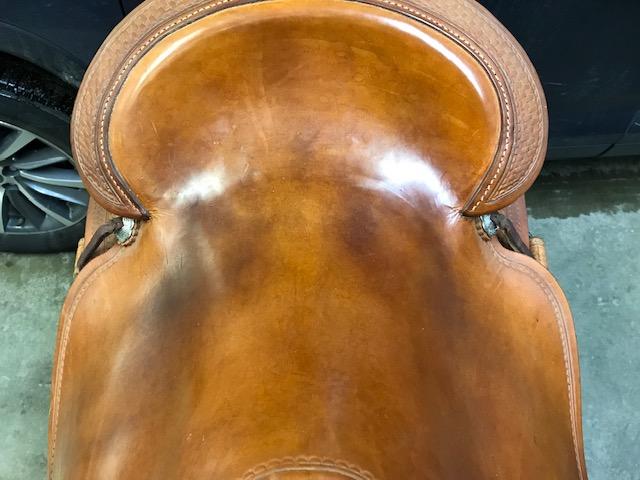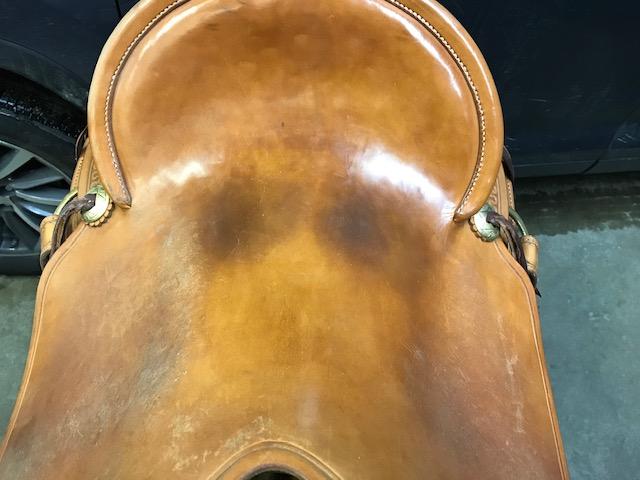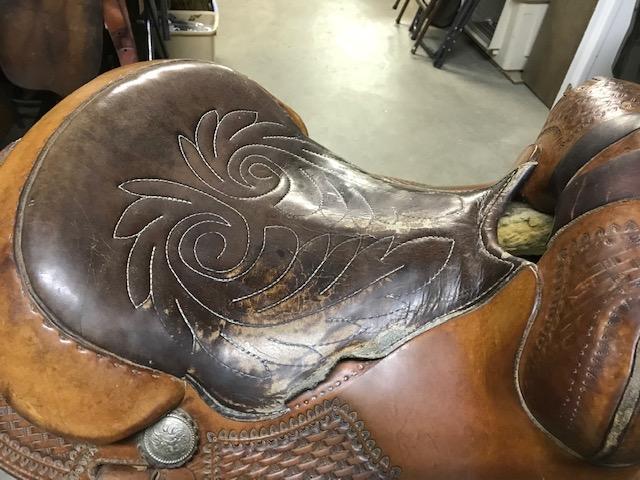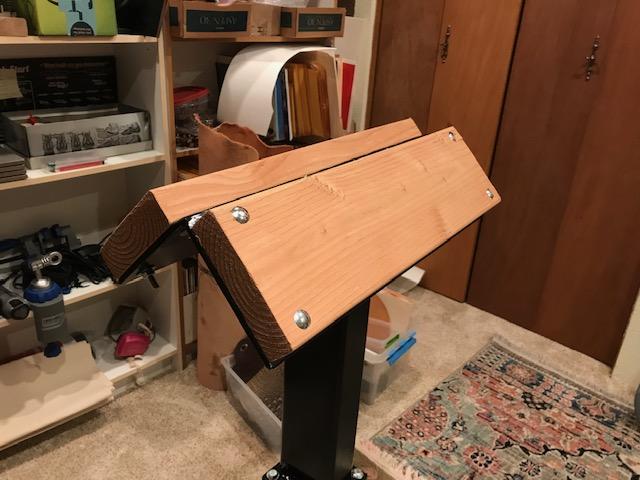-
Posts
210 -
Joined
-
Last visited
Content Type
Profiles
Forums
Events
Blogs
Gallery
Store
Everything posted by Squilchuck
-
Can you all help with groundseat construction? I have made 4 saddles for myself (3, seats below) and my wife, and am about to make one for a lady friend. Here are two questions: 1. Can you explain how to shape different groundseats for men and woman? 2. Can you look at the wear patterns on three saddles I've made for myself (pictured below) and tell me if I might need to shape a man's (mine, anyway) seat differently? Seems they all have worn about the same. Looks like my seat bones have bridged the middle of the seat, leaving an unworn spot. Maybe the top middle needs to be more rounded? The low spot of the seat from the side in all was carved to be in front to the edge of the cantle. I do feel it in my seat bones if I ride for many hours. First two saddles were made on Buster Welch trees, the third is an Oregon Wade. (Those spur tracks on #2 are the result of horse, jeep, and two motorcycles meeting on a forest road. No one hurt - except my pride, especially when my partner said I used to be able to ride quick unexpected spooks like that. Time marches on!). Thanks. --John
-

How do I use beeswax on my burnished edges?
Squilchuck replied to Leather20's topic in How Do I Do That?
I agree with Mike. I use it all the time. Edge, dye, burnish with water and bar saddle soap, dry, burnish with light coat beeswax rubbed on at room temp. I use canvas to burnish but sometimes a hard burnisher at saddle soap stage. Use lots of rubbing to generate heat. I've used parafin too but beeswax is better. I think the gum trag seals up the edge and the beeswax doesn't set into the leather. Using a hard wood burnisher doesn't seem to work well - just gums up the burnisher. --John -

First Saddle - 1/2 tooled Cliff Wade
Squilchuck replied to MLGilbert's topic in Saddle & Tack Maker Gallery
Great job! Nice lines and careful work. Carving is beautiful. It has just the right color and contrast - bright. I don't do too much floral tooling but always think my pieces are too dark and not enough highlights. What was your finishing process for the carved pieces? The usual Sheridan antiquing process with what resist, stain, and finish? --John -
I'd rather not see it at all on a leatherworking forum. I can't ignore them because I see the topic line on the unread post list I look at each morning. We are bombarded w politics all the time. Why can't we have a place without it for a normal conversation? Why not post on another forum? I'd guess a very small number of forum readers want to talk politics. What's next - religion, (you name it)?
-
104 rivets are self-piercing set with a Little Wonder or larger press from Weaver. Well worth the investment. You can set with a cap or splash anvil. The 104 setter die comes w the Little Wonder. I think you have to buy the anvil to set caps. --John
-

Help setting long 104 rivet w Little Wonder press
Squilchuck replied to Squilchuck's topic in Hardware and Accessories
Half inch set into a cap, not splash anvil. -
I've made four. First one I decided to make the Stohlman #1 saddle and follow the detailed and excellent instructions and tool list. Lots of ways of doing things, so simpler to follow "the recipe" the first time if you don't have a teacher, even though its said some of his methods are old fashion especially all-leather ground seats. Since then I've mixed up methods from Watt and Adams (eg fitting seat, cutting patterns) to find methods that work for me. For trees, three of the saddles have custom Bowden trees made from measurements taken w Dennis Lane system w my horses. Other custom tree makers using the DL system are more expensive. I've been satisfied w Bowden trees. Another tree is a Timberline wade, which is nice and Randy will work w you to get the right tree. I only use Herman Oak 11/13oz #1 skirting leather. My farrier, who has made saddles for 40 years, gave me plenty of advice. Lots of good advice in the archives of this group, too. Good luck! -John
-

Belt length measurements and centering names on the back
Squilchuck replied to Maint1517's topic in How Do I Do That?
Buy the Stohlman belt making book from Tandy. Cheap. It will answer your questions and much more. Great investment if you are making belts -John -
There is one in the Stohlman saddle-making book Vol 1, if you have it. I could scan the page if no one has one handy to send. -John
-
I have always used regular solvent-based rubber cement (mostly toulene-free Barge blue can) to glue fleece to saddle skirts, but I'm getting tired of the fumes. I long ago switched to Aquilim 315 as my contact cement, except for using Renia Top Fit solvent cement for wet leather, so wonder about a switch to Aquilim rubber cement. Renia has two types of "rubber cement" - the GL and SG products. Anyone know which one would be best for fleece? I'm guessing the more permanent GL bond would be stronger, but wonder if future saddlers will be able to easily remove it in 10-15 years to replace a fleece? The SG cement seems to have a weak bond suitable for very temporary applications like sewing, so I wonder if the fleece would lift off the skirt with use. What do you think? Aquilim GL or SG for fleece gluing? --John
-
I've molded phone cases, knife sheaths and gun holsters (pistols, rifle) using Stohlman's methods as described above, but use a bone folder for sheaths. I soak only for less than a minute in warm water, then let case an hour or so for sheaths. For holsters I stick the gun in a few minutes after setting then shape with fingers. Leather weights are from 6-9 oz. -- John
-
Sold a while back. -John
-

Thread/needle size saddle skirting - Tipmann Boss
Squilchuck replied to thenrie's topic in Saddle Supplies, Tools & Trees
Not sure what the Boss can handle, but I use 346 or 277 on top and 277 bottom. -John -
Here's a photo. She wants top grain leather but no stitching (good). The padding feels OK. I'll decide on replacing padding when I disassemble, but probably should replace since it will be apart. I've read about padding others use, but not sure of the best option. A question - could I get away with not pulling the seat off the cantle dish and still lift it enough to hand sew? -John
-
Glad to find this old topic. I've managed to not fix any seats, but want to do a favor for one of the young kids in our club. A learning experience! I've made a few saddles but never with an added seat leather or padding. Keith's instructions are good, but a couple questions. Can I use rubber cement effectively instead of contact cement? Stohlman uses rubber cement in his saddle making book. Seems like rubber cement is more forgiving w a novice like me, but I wonder about sticking over the life of the saddle. Seems like it should w a rider sitting on it? Stitching repairs is always tricky getting in the old holes. Any tips for doing that? I have a machine, but can hand sew if best. - John
-
I'm in Washington so don't know much about your area. But, there's Pedro Pedrini at Hamleys in Pendleton. You might ask at Oregon Leather store in downtown Portland. They also have a leather shop. --John
-

Covering a saddle-maker's stand?
Squilchuck replied to Squilchuck's topic in Saddle Supplies, Tools & Trees
Thanks! -John -

Covering a saddle-maker's stand?
Squilchuck replied to Squilchuck's topic in Saddle Supplies, Tools & Trees
Thanks for the photos -a great illustration. Under the leather covering is the shaped styrafoam you mentioned? -John -

Covering a saddle-maker's stand?
Squilchuck replied to Squilchuck's topic in Saddle Supplies, Tools & Trees
Thanks for the good advice, guys. Still a work in progress as the tree came late and the weather has been great for outdoor ventures. I used a horse blanket to give some shape and lift to the front, but I'll rethink that based on your advice. --John -
I'm not tooling all the time so I keep most stamps in tool rolls I made from a pattern in Leathercrafters Journal. Handy and saves a lot of space. I have a small wood holder for swivel knives and stamps I'm using on a particular project. I love the Ferris wheel design though! --John
-
I buy #1 HO skirting from from Montana Leather and most else from Hide House. Both give great price and service, and you can get a business discount. -John
-
I had this saddle-maker's stand built on top of a salon chair. I'm trying to figure out how to finish the top. One thought was bark sheepskin overall and doubled in wither end for a bit of lift. But, then it felt a bit too soft when I pressed down on my new saddle tree. Any suggestions? --John
-
I've followed that forum for a few years and it seems like activity has dropped recently. However, there is a wealth of information from many years of discussion. You likely will find the answers in old discussions if you search. --John
-
Nice work! Was it tough getting the Cheyenne roll cover off in good condition? Did you flatten the old seat to make a cutting template or start from scratch? --John







